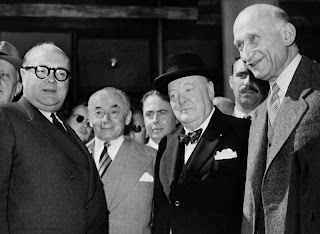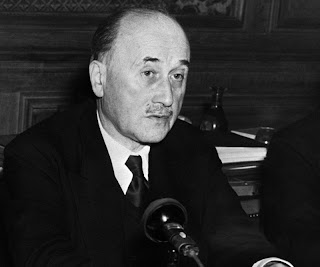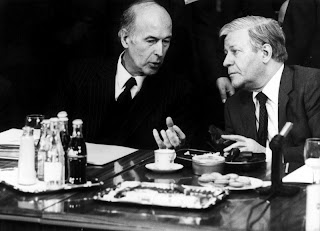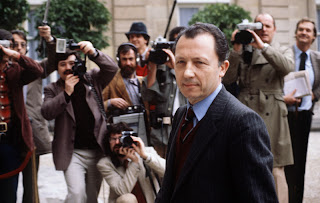EU Elections in France – Some Background
From the desk of Tiberge on Wed, 2009-05-06 15:06
It is time to take a cursory look at the European elections scheduled for June 7. I’ll use Le Figaro’s series of articles – there are at least 25 of them – as a guide, but other more interesting and subjective points of view can be found at the pro-sovereignty blogs.
While slide shows are usually just photos of celebrities, this one is informative as well, showing the major architects of what we call today the European Union. Two themes emerge from the captions: the fundamental roles played by France and Germany in the creation of this behemoth, and the early advocacy by the founders of a supranational Europe. Begun as a defensive measure, soon an economic agreement, it wasn’t long before the underlying ambition to create a political, hence anti-national, entity was explicit. This political ambition would be fiercely opposed by Winston Churchill and Charles de Gaulle, were they here.
Below, Churchill is surrounded on the left by Belgian Prime Minister Paul-Henri Spaak, French Prime Minister Paul Reynaud, and on the right by Robert Schuman, considered the “father of the European Union,” a man with deep roots both in French and German cultures. Born in Luxemburg, he became a French deputy, then held several ministerial posts before becoming President of the European Parliament in 1958. In 1950 Schuman had spearheaded the creation of a High Authority to oversee French and German coal production. This led in turn to CECA, the European Coal and Steel Community, the precursor of today’s EU. Deeply religious, Schuman is now being considered by the Vatican for beatification.
Note: The date of the photo is not specified. Paul Reynaud had been prime minister only for a short while in 1940.
Reading about Robert Schuman, it is hard to fathom what he would think of the situation today. He died in 1963.
Like Robert Schuman, Jean Monnet (1888-1979) (below) was an initiator of CECA. And like many of the founding fathers, he became known for his advocacy of a United States of Europe. An architect of post-war European economics, he coordinated the French Plan for modernization and equipment. In 1943 he made the following statement:
There will be no peace in Europe, if the states are reconstituted on the basis of national sovereignty [...] The countries of Europe are too small to guarantee their peoples the necessary prosperity and social development. The European states must constitute themselves into a federation […]
Monnet is often accused of being the prime destroyer of French national sovereignty. But back then, in 1943, things may have appeared differently. The magnitude of the devastating war may have made such a federation appear to be the only solution to internal rivalries that, unchecked, lead to the deaths of millions. On the other hand, Monnet may have been far too pessimistic regarding the abilities of the individual nations to recuperate and flourish.
Below, Valéry Giscard-d'Estaing, President of France from 1974 to 1981, with German Chancellor Helmut Schmidt. Giscard created the summit of European heads of state, that became the European Council in 1986. A strong believer in a united Europe, Giscard wrote the European Constitution in 2004. Rejected by the French on May 29, 2005, it returned to the limelight under the name of Treaty of Lisbon in 2007. Rejected by Ireland in 2008, it is nonetheless expected to be adopted, despite the efforts of sovereigntists to block it.
Below, François Mitterand and Helmut Kohl. Mitterand signed numerous fundamental agreements of the EU, in particular the Treaty of Maastricht in 1992 which transformed the EEC (European Economic Community) into the EU (European Union). Maastricht was the fruit of a joint effort between these two leaders, an effort that accelerated with German reunification in 1990. Below, an early photo of Jacques Delors (b. 1925) who was President of the European Commission from 1985 to 1994. Originally a Gaullist, he became a Socialist in 1974 and laid the groundwork for the adoption of the Euro in 2002. A left-wing Catholic, Delors is openly religious despite the anti-religious sentiments prevalent in the Socialist Party. His daughter, Martine Aubry, is chairman of the French Socialist Party and mayor of Lille (Rijsel), the capital of the French part of Flanders.
Below, an early photo of Jacques Delors (b. 1925) who was President of the European Commission from 1985 to 1994. Originally a Gaullist, he became a Socialist in 1974 and laid the groundwork for the adoption of the Euro in 2002. A left-wing Catholic, Delors is openly religious despite the anti-religious sentiments prevalent in the Socialist Party. His daughter, Martine Aubry, is chairman of the French Socialist Party and mayor of Lille (Rijsel), the capital of the French part of Flanders.

If you consult this map you will see that France has been divided into 8 regions for purposes of voting in the EU elections: North-West, East, South-East, South-West, West, Center, Ile-de-France and Overseas Territories. Seventy-two deputies will be elected from these regions, six fewer than there are now, and fifteen fewer than in 1999. This loss is due to the population growth in Germany and the additional countries that have joined the EU. Since regions (and the smaller departments that comprise them) are instrumental in the allocation of government subsidies and employment opportunities, any major victory for a political party can mean the difference between growth and stagnation, and can also determine which industries grow and which decline. The European Commission and Parliament are now the primary operatives in the economic, social and cultural destinies of the 27 nations. The nations have all been adjusting their individual constitutions to conform to directives from Brussels.
If you place your cursor over one of the regions you will see the names of those candidates whose names are first on the slate for their party. For example, in the South-East, F. Grossetête is the first UMP candidate, while Jean-Marie Le Pen heads the list for the Front National.
The deputies will be elected according to a proportional system that allows smaller parties, such as the Front National or extreme-leftist movements to sit in Parliament, even though they have no representation in the National Assembly or Senate. To obtain a seat, a party in any given region must obtain at least 5% of the votes.
Yesterday (May 5) Nicolas Sarkozy gave a speech in the city of Nîmes emphasizing again his vision of a protectionist Europe that gives preference to Europeans. He also outlined his latest brainstorm – a new project for Turkey as a sort of privileged partner on security and economic issues, but without actual membership in the EU.

vote
Submitted by Thalpy on Wed, 2009-05-06 16:43.
Just what does the vote stand for in the EU elections?